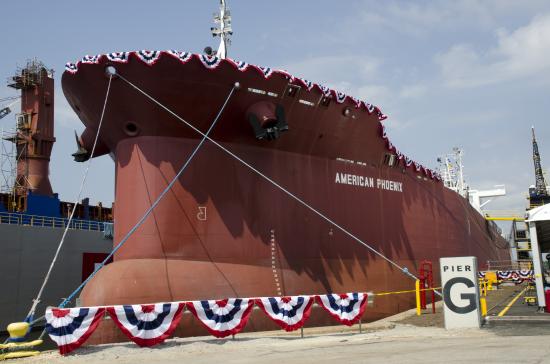American Phoenix during her 2012 christening at BAE Systems shipyard in Mobile, AL.
 By Anna Louie Sussman
By Anna Louie Sussman
NEW YORK, June 27 (Reuters) – ExxonMobil has taken a long-term charter on the U.S.-flagged American Phoenix oil tanker at a near record rate of around $100,000 per day, trade sources said, highlighting the scarcity of vessels available to ship oil and refined products between United States ports.
The 339,000-barrel tanker, which was re-leased by Koch Shipping and Supply, is thought to have been the only one of around three dozen so-called Jones Act tankers available for lease, with traders having snapped up others to help move surging output from Texas’s Eagle Ford shale to Gulf Coast refiners.
The American Phoenix had struggled over the past few months to find a re-lease at the rates Koch was offering, and had been available in the spot market as recently as mid-June, brokers said, raising questions about whether the more than 50 percent surge in Jones Act rates since last year was sustainable.
But they said the relatively high rate, above the $75,000 per day that they described as the going rate for that size ship, suggests that the Jones Act market remains tight.
Exxon declined to comment on the lease and a Koch spokeswoman could not be reached for comment.
It is unclear how Exxon will use the tanker, or whether it will seek to convert it from carrying refined, or “clean” products to carrying “dirty” crude oil. The Phoenix was employed for crude oil service late last year, but was converted back to refined fuels several months ago.
The re-lease will run for two years, until the end of Koch’s term charter from owners Mid Ocean Marine.
Rates for Jones Act tankers, previously used primarily to ferry gasoline and diesel from Gulf Coast refiners to Florida or the East Coast, have surged this year as traders take up half a dozen vessels to carry Eagle Ford from the port of Corpus Christi to refiners up the coast in Houston or Louisiana.
The Jones Act from 1920 requires all vessels operating between U.S. ports to be U.S.-built, U.S.-owned and U.S.-crewed in order to protect the United States commercial industry.
There are fewer than 50 tankers currently moving crude oil and refined products between U.S. ports; around a dozen of them trade strictly between Alaskan production sites and refineries on the West Coast.
The American Phoenix is currently in Miami, Florida, after leaving from Port Canaveral, Florida, according to historical vessel tracks. In the past month, it has moved between Southwest Pass, Louisiana, and ports in Florida, where it was presumably delivering gasoline or another refined fuel.
http://www.youtube.com/watch?v=i8ZKSIuBvTQ
(c) 2013 Thomson Reuters, Click For Restrictions

 Join The Club
Join The Club











